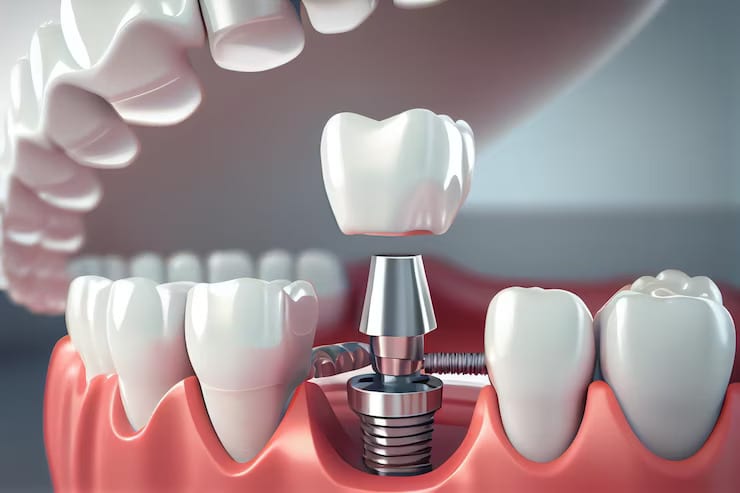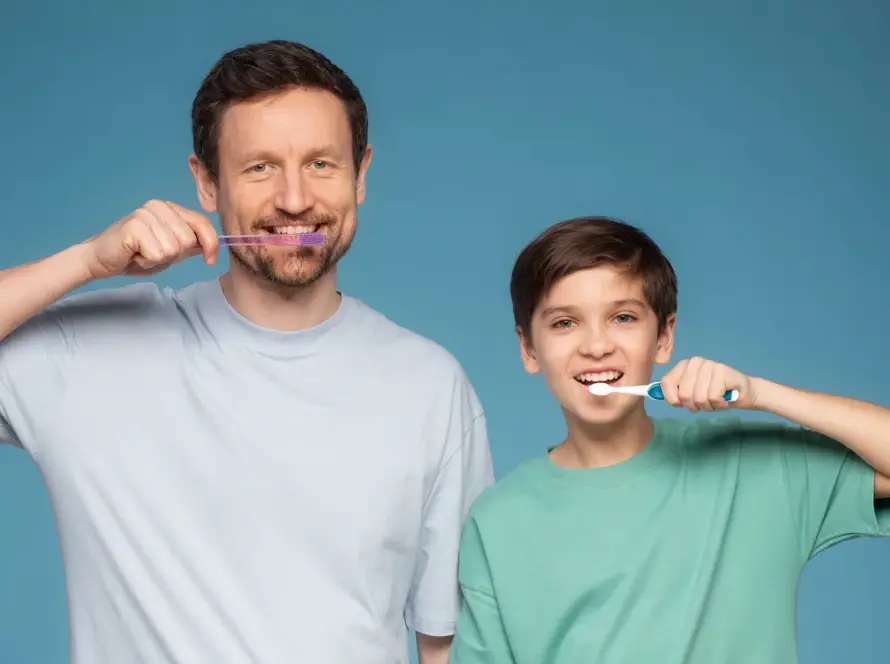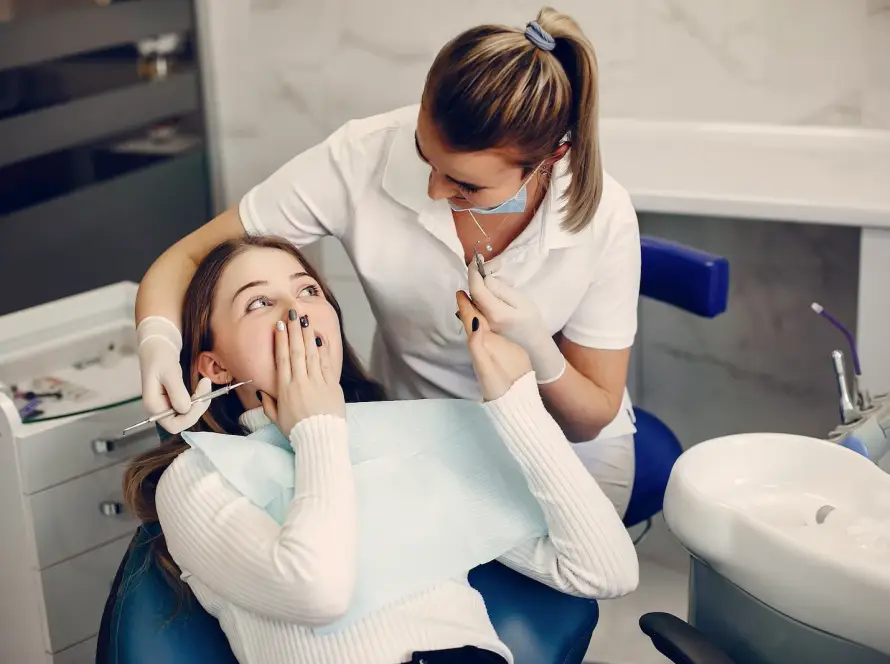Composite veneers have become a popular choice for individuals seeking to enhance the appearance of their teeth. These veneers are crafted from a composite resin material that can be customized to match the natural shade of the patient’s teeth. The process involves several key steps to ensure optimal results and patient satisfaction.
Process of Composite Veneers Application
The application process includes:
- Consultation: The dentist evaluates the patient’s dental health and discusses aesthetic goals.
- Preparation: Minimal tooth preparation is needed compared to porcelain veneers. The dentist may slightly etch the tooth surface to ensure proper adhesion.
- Application: The composite material is carefully applied in layers, allowing the dentist to mold and shape it to achieve natural contours.
- Curing: Each layer of composite is hardened using a special light.
- Shaping and Polishing: The final veneer is shaped and polished, providing a seamless appearance.
Benefits of Composite Veneers
Composite veneers offer several advantages:
- Cost Effective: They are generally more affordable than porcelain veneers.
- Minimally Invasive: Less tooth enamel removal is required.
- Quick Application: The entire procedure can often be completed in one visit.
- Reversibility: Unlike porcelain veneers, composite veneers are considered reversible.
Limitations of Composite Veneers
While beneficial, there are limitations to consider:
- Durability: Composite veneers are less durable than porcelain and may chip or stain over time.
- Aesthetic Limitations: They may not achieve the same translucency and natural appearance as porcelain.
- Maintenance: Requires more frequent polishing and maintenance.
Ideal Candidates for Composite Veneers
Suitable candidates for composite veneers typically include:
- Individuals with minor cosmetic imperfections such as chips, gaps, or discoloration.
- Patients seeking a non invasive, reversible option.
- Those looking for a cost effective cosmetic dental solution.
Summary of Key Points
Composite veneers offer a versatile and budget friendly solution for cosmetic dental improvements. Their primary appeal lies in their cost effectiveness, minimal invasiveness, and quick application process. However, limitations such as reduced durability and aesthetic differences compared to porcelain veneers should be considered. Understanding these aspects can help patients make informed decisions regarding their dental care options.
Why Consider Turkey for Dental Treatments?
Many individuals seeking dental treatments, especially composite veneers, are increasingly looking towards Turkey. There are several compelling reasons why Turkey stands out as an attractive destination for dental procedures.
Cost Effectiveness
- Affordability: One of the primary reasons to consider Turkey is the cost-effectiveness of dental treatments. Composite veneer procedures in Turkey can be significantly less expensive than those in Western countries like the United States, the United Kingdom, or Australia. On average, patients can expect to save 50% to 70% on dental costs in Turkey.
- All Inclusive Packages: Many Turkish dental clinics offer all-inclusive packages that cover accommodation, transportation, and even tourism experiences alongside dental treatments. This bundling of services further enhances the cost savings for international patients.
High Quality Care
- Advanced Technology: Turkish dental clinics are equipped with state-of-the-art technology and modern facilities, ensuring that patients receive high-quality care. The use of advanced equipment and techniques contributes to successful and efficient treatment outcomes.
- Qualified Professionals: Dentists in Turkey are highly skilled, often having trained or practiced internationally. They maintain high standards of care and adhere to international protocols, often speaking multiple languages to better communicate with foreign patients.
Convenience for International Patients
- Easy Accessibility: Turkey’s strategic location, sitting at the crossroads of Europe and Asia, makes it easily accessible from various parts of the world. Major cities like Istanbul, Ankara, and Izmir have well connected international airports, facilitating convenient travel arrangements for dental tourists.
- Visa and Travel Benefits: Most tourists can obtain an e-visa easily and quickly, simplifying the travel process. Furthermore, the country’s robust tourism industry means ample availability of tourism services, enhancing the overall travel experience.
- Comprehensive Services: Top dental clinics in Turkey often provide comprehensive services that cater to the needs of international patients. These include translation services, travel assistance, and postoperative care, making the entire treatment process seamless and stress free.
Cultural and Touristic Appeal
- Rich Heritage and Culture: Combining dental treatments with a vacation is an added perk. Turkey boasts a rich cultural heritage, including historical sites, breathtaking landscapes, and a welcoming atmosphere, attracting tourists from all corners of the globe.
- Comfort and Leisure: Patients can relax and recuperate in luxurious settings. The country offers a variety of leisure activities ranging from spa experiences to beach resorts, providing a holistic healing environment.
In conclusion, Turkey presents an attractive option for those seeking affordable, high-quality dental treatments in a welcoming and culturally rich environment.
Cost Breakdown: Composite Veneers in Turkey
When considering composite veneers, Turkey has established itself as a prominent destination due to competitive pricing paired with high-quality dental services. The cost of composite veneers in Turkey consists of several components, which include:
- Consultation Fees:
- Initial consultation fees can range from $50 to $100. This typically covers an examination and treatment plan consultation.
- Per Tooth Veneer Cost:
- Composite veneers generally cost between $60 to $150 per tooth. The price may vary depending on the complexity and size of the veneers required.
- Preparation and Application:
- The preparation and application procedures, including tooth cleaning, shaping, and bonding, may incur an additional cost of about $20 to $40 per tooth.
- X-rays and Diagnostic Tests:
- Necessary X-rays and other diagnostic tests can add about $30 to $70 to the overall cost. This ensures that the dentist has a clear understanding of the patient’s dental structure.
- Materials and Equipment:
- The cost of high-quality composite resin, bonding agents, and other materials may range from $25 to $50 per tooth, depending on the brands and quality standards adopted by the dental clinic.
- Laboratory Fees:
- Some clinics might charge a laboratory fee for custom-made veneers, which could be approximately $40 to $80 per tooth. This ensures that veneers are crafted to fit perfectly and match the natural appearance of teeth.
- Post-Procedure Care:
- Follow-up visits and post-procedure care can add an extra $20 to $50. This often includes polishing, minor adjustments, and ensuring the long-term success of the veneers.
- Additional Services:
- Depending on the clinic’s offerings, additional services such as sedation or anesthesia might cost between $50 and $150.
Prices could vary based on the clinic’s reputation, location within Turkey, and the expertise of the dentist. Some clinics may offer package deals that include multiple services at a discounted rate, providing more value to patients.
Overall, the cost structure of composite veneers in Turkey presents a substantial saving when juxtaposed with prices in other countries, making it a cost-effective option for dental aesthetic treatments.
Comparing Costs: Turkey vs. the US
The cost comparison between composite veneers in Turkey and the United States highlights significant differences influenced by various factors. Here are key points to consider:
- Average Costs:
- Turkey: The average cost of composite veneers in Turkey ranges from $150 to $350 per tooth. This includes consultation, dental procedure, materials, and local anesthesia.
- United States: Conversely, in the U.S., patients can expect to pay between $800 and $2,500 per tooth for similar services. This price difference is mainly due to higher labor costs, overhead expenses, and insurance overheads in the U.S.
- Clinic and Dentist Expertise:
- Turkey: Many Turkish clinics offer competitive pricing due to lower operational costs and offer high-quality services. Turkish dentists often undergo extensive training, and clinics may provide comprehensive treatment packages that include accommodations and transport.
- United States: While U.S. dentists also possess high qualifications, the cost structure significantly includes the regulations and higher wages in the medical field. Moreover, U.S. clinics typically do not bundle additional services like travel or accommodation.
- Insurance and Payment Options:
- Turkey: Dental insurance rarely covers cosmetic dentistry procedures like composite veneers. However, Turkish clinics may offer flexible payment plans and financing options to make the procedures more accessible.
- United States: In the U.S., dental insurance policies also often exclude cosmetic procedures. Some clinics do provide financing plans, yet the overall cost remains higher due to additional partner fees and interest rates.
- Additional Services and Packages:
- Turkey: Clinics in Turkey tend to offer all-inclusive packages that cover the consultation, procedure, follow-up visits, and even tourism activities. These packages can be a cost-saving measure and a convenient option for international patients.
- United States: U.S. clinics generally offer limited packaging options. Patients typically incur separate charges for consultations, follow-ups, and any supplementary treatments.
- Travel and Accommodation:
- Turkey: The overall cost-effectiveness is further amplified by affordable travel and accommodation options. Many clinics provide assistance with travel arrangements, ensuring a seamless experience.
- United States: For local residents, travel costs are minimal, but for those traveling domestically or internationally, these costs can add significantly to the overall expense.
This cost comparison emphasizes the economic benefits of opting for composite veneers in Turkey, balanced against the higher quality and regulatory standards of dental care provided in the U.S.
Cost Comparison: Turkey vs. the UK
The cost of composite veneers can vary significantly between Turkey and the UK. Several factors influence the price difference, including dentist expertise, clinic overheads, and regional economic conditions. This section outlines the areas of cost variance and provides a detailed analysis.
In Turkey, composite veneers are notably more affordable due to:
- Lower Operational Costs: Clinics in Turkey typically face reduced operational costs, including rent and salaries.
- Economic Exchange Rates: Favorable exchange rates for foreign patients can substantially reduce the cost when converting currencies.
- Government Support: Turkish government initiatives support the healthcare tourism industry, often bringing down treatment costs through incentivized programs.
In the UK, several elements contribute to higher prices:
- Higher Overheads: UK dental practices incur higher costs for rent, utilities, and salaries.
- Stricter Regulations: Meeting stringent regulatory and compliance requirements can add to operational expenses.
- Labor Costs: The higher cost of labor influences the overall pricing structure.
Detailed Cost Breakdown
- Average Cost in Turkey: Between $100 to $250 per tooth.
- Average Cost in the UK: Between $400 to $1,500 per tooth.
Example Scenario
Quotes from multiple clinics reveal:
- A person receiving composite veneers for 10 teeth:
- In Turkey: Could expect to pay between $1,000 and $2,500.
- In the UK: Might incur costs ranging from $4,000 to $15,000.
It is important to balance cost with quality. In Turkey:
- High-Quality Results: Many clinics in Turkey boast internationally trained dentists and modern facilities, maintaining a high standard of care.
In the UK:
- Established Reputation: UK clinics often benefit from long-standing reputations and a strong focus on regulatory compliance, ensuring reliability.
Thus, potential patients are advised to consider both the financial and qualitative aspects before making a decision on where to undergo treatment.
Cost Comparison: Turkey vs. Australia
When comparing the cost of composite veneers between Turkey and Australia, several key factors come into play, impacting the overall affordability and value for patients.
Pricing Overview
- Turkey:
- Initial consultation fees are generally low or sometimes included in the treatment cost.
- The average cost per veneer ranges from $100 to $300.
- Packages often include accommodation, transportation, and other amenities.
- Australia:
- Initial consultation fees can range from $100 to $200.
- The average cost per veneer is significantly higher, ranging from $800 to $1,500.
- Additional services such as accommodation and transportation are typically not included.
Quality and Standards
- Turkey:
- Features high-quality dental clinics with modern equipment.
- Dentists are often internationally trained.
- Treatment standards are comparable to Western countries.
- Australia:
- Maintains strict regulatory standards for dental practices.
- Clinics are known for high standards and state-of-the-art equipment.
- Extensive follow-up care practices are prevalent.
Additional Costs
- Turkey:
- Travel expenses include flight tickets, which can vary based on the season.
- Some clinics offer all-inclusive packages covering various non-medical costs.
- Australia:
- Local travel costs are typically low but not included in treatment costs.
- Post-treatment follow-up consultations might add to the total expense.
Insurance and Payment Plans
- Turkey:
- International patients might need to check with their insurers about coverage.
- Flexible payment plans are often available to ease the financial burden.
- Australia:
- Many insurance plans partially cover cosmetic dental procedures.
- Dental practices may offer payment plans, but out-of-pocket expenses remain considerable.
Overall Financial Impact
- Turkey:
- The affordability of procedures in Turkey can outweigh the travel expenses for many international patients.
- Comprehensive packages provide good value for money.
- Australia:
- While costs are higher, patients benefit from proximity and potentially better post-procedure care and follow-ups.
- High out-of-pocket expenses might deter some patients from undertaking non-essential cosmetic procedures.
In conclusion, contrasting the costs and inclusivity of services between Turkey and Australia reveals clear differences that could influence a patient’s decision based on budget, desired service level, and overall value.
Travel and Accommodation Costs for Dental Tourists
Travel and accommodation costs are significant factors for dental tourists to consider when evaluating whether to undergo procedures such as composite veneers abroad. These expenses can vary widely depending on the destination, quality of stay, and the time spent in the host country.
Travel Expenses:
- Flights: Airline ticket prices fluctuate based on the time of year, duration of the flight, and the airline company. Flights to Turkey from major cities in Europe or North America can range from $200 to $1,200 depending on these variables.
- Local Transportation: Costs for getting around within Turkey are lower compared to many Western countries. Options include public transportation (buses, trams, subway), taxis, and rideshare services like Uber.
Accommodation Costs:
- Hotels: Options range from budget-friendly stays to five-star luxury hotels. Budget hotels or guesthouses may charge as little as $20 to $40 per night, while high-end hotels in major cities like Istanbul may range from $100 to $300 per night.
- Short-term Rentals: Websites like Airbnb offer a variety of accommodations, including apartments and entire homes, with daily rates typically starting at around $25, depending on the location and size of the property.
- Extended Stays: Dental treatments that require longer recovery times may necessitate extended stays. Many hotels and rental properties offer discounts for weekly or monthly stays, making this option considerably more economical.
Additional Expenses:
- Meals and Dining Out: Dining costs in Turkey are generally lower than in many Western countries. A meal at a mid-range restaurant might cost $10 to $20 per person, while local eateries can offer meals for less.
- Tourist Activities: Dental tourists often combine their treatment with sightseeing. Entry fees to cultural attractions, guided tours, and other leisure activities will add to the overall budget.
Cost Comparison:
- European Countries: Accommodation and daily expenses in countries like Germany, France, or the United Kingdom tend to be higher. Travelers can expect to pay more for mid-range hotels ($100 to $250 per night) and dining ($20 to $40 per meal).
- North America: Similar to Europe, the costs in the United States and Canada are generally more expensive. Hotel rates vary significantly but can easily exceed $150 per night in major cities.
Understanding the travel and accommodation costs is crucial for dental tourists aiming to make an informed decision about undergoing composite veneer treatments internationally, particularly in Turkey.
Additional Costs: Consultations, Follow-Ups, and Maintenance
When evaluating the overall expense of composite veneers in Turkey versus other countries, it’s vital to consider additional costs that may arise. These supplementary expenses often include, but are not limited to, consultations, follow-up appointments, and maintenance.
Consultations
Consultation fees can vary significantly depending on the location and the expertise of the dentist. In many developed countries, consultation fees may be higher due to the higher cost of living and practice. Dentists in countries like the United States, the United Kingdom, and Canada often charge more for initial consultations.
However, in Turkey, the cost of consultations tends to be more affordable. Some clinics may even offer complimentary initial consultations as part of their patient acquisition strategy.
Follow Ups
Follow up appointments are essential for ensuring that the veneers are properly installed and that there are no complications. In countries with higher dental care costs, each follow up visit can add a substantial amount to the overall expense. These follow up sessions typically include:
- Routine checks to ensure the veneers are holding up well.
- Minor adjustments that might be necessary as the veneers settle.
In Turkey, follow up costs are generally lower. Due to competitive pricing and an emphasis on medical tourism, many Turkish clinics provide several follow up visits as part of their package deals.
Maintenance
Maintaining composite veneers is critical for their longevity and appearance. This involves routine dental check ups, cleaning, and occasional minor repairs. Dentists in Western countries often have higher fees for these services due to their operating costs, labor costs, and market positioning.
Conversely, in Turkey, maintenance costs for composite veneers tend to be more budget-friendly. Turkish clinics often offer comprehensive maintenance packages that cover annual cleanings and minor repairs, making it easier for patients to keep their veneers in optimal condition without incurring heavy costs.
In summary, while the initial cost of composite veneers is a significant consideration, additional expenses such as consultations, follow ups, and maintenance must be factored in. These costs can vary more widely between Turkey and other countries, influencing the total cost of dental veneer procedures.
Quality and Expertise in Turkey vs. Other Countries
When comparing composite veneers in Turkey versus other countries, several factors emerge that highlight both quality and expertise variances.
Dental Expertise
- Training and Education:
- Dental professionals in Turkey often obtain their education from reputable institutions, both domestic and international.
- In other countries, particularly in Western Europe and North America, dental education is stringent with mandatory continuous professional development, which may elevate their expertise.
- Experience:
- Turkish dentists frequently deal with a high volume of international patients, enhancing their experience in cosmetic dentistry.
- Dentists in countries like the USA and the UK possess extensive experience due to advanced training and exposure to cutting edge dental technologies.
Technology and Equipment
- Technological Advancements:
- Clinics in Turkey strive to utilize state of the art equipment and adhere to global standards.
- Dental clinics in countries like Germany and Japan are known for implementing the latest technological advancements, often leading to superior precision in treatments.
- Innovation Adoption:
- Turkish dental practices steadily adopt new techniques and innovations due to competition in the medical tourism market.
- Developed countries frequently set the benchmark for innovative practices and technologies in the dental field.
Materials and Procedure
- Quality of Materials:
- Turkey sources high quality composite materials for veneers from top international suppliers, ensuring patient safety and longevity.
- In countries like Switzerland and Canada, there is stringent regulation of materials, often leading to assurance of superior quality.
- Procedural Standards:
- Clinics in Turkey follow procedures compliant with international standards, often accredited by global dental organizations.
- In other countries, clinics are under strict health regulations and certifications, ensuring high procedural standards.
Patient Experience
- Consultation and Communication:
- Turkish dental clinics emphasize comprehensive consultation sessions and multilingual support to cater to international patients.
- Clinics in Australia and the UK ensure detailed consultations, prioritizing patient understanding and comfort through transparent communication.
- Aftercare Services:
- Turkish clinics provide robust aftercare services, including follow-up consultations and remote assistance.
- In nations like the USA, aftercare services are integral, with a focus on ensuring long-term patient satisfaction and success of the procedure.
Overall, each country’s level of quality and expertise in composite veneers is influenced by various aspects, including the dentist’s training, technological implementation, material quality, procedural adherence, and patient centric approaches.
Insurance and Financing Options
Insurance and financing options play a crucial role in the decision to obtain composite veneers, particularly when comparing costs between Turkey and other countries. Several factors come into play when considering these options:
- Insurance Coverage:
- Many U.S. and European insurance policies do not cover cosmetic dental procedures, including composite veneers, as they are often deemed non-essential.
- Some Turkish clinics have partnerships with international insurance companies, potentially offering coverage or partial reimbursement for cosmetic procedures.
- It is advisable for patients to consult their insurance provider to understand the extent of coverage for overseas dental treatments.
- Financing Plans:
- Local Clinics in Turkey:
- Many dental clinics in Turkey offer in house financing plans, making it easier for patients to manage the costs.
- Some clinics provide installment payment options that allow spreading the cost over several months.
- International Clinics:
- Clinics in countries like the U.S. and the U.K. typically offer financing through third party companies that specialize in medical loans.
- Interest rates and repayment terms vary widely. Patients should compare plans to identify the most cost effective solution.
- Local Clinics in Turkey:
- Payment Methods:
- Turkey:
- Payment methods are varied, including credit cards, debit cards, bank transfers, and sometimes even cryptocurrency.
- Discounts may be available for up front or cash payments.
- Other Countries:
- Advanced financial instruments like dental credit cards or loans are often available but may come with higher interest rates.
- Payment flexibility may depend significantly on the individual clinic’s policies.
- Turkey:
- Cost Transparency:
- Turkish clinics are known for providing clear, upfront cost estimates and often include consultation fees in the overall package.
- In contrast, clinics in other countries might not always disclose hidden costs, such as follow-up consultations or additional treatments.
- Government and Organizational Support:
- In countries like Turkey, there may be government incentives or subsidies aimed at promoting medical tourism, which can indirectly reduce the financial burden.
- International patients may benefit from specific packages tailored for dental tourism that include accommodation and transport services.
- Currency Exchange Rates:
- Favorable exchange rates can make dental treatment particularly affordable in Turkey for international patients.
- It is important for patients to monitor currency trends and consider timing their payments to take advantage of rate fluctuations.
By understanding the scope of insurance and financing options, patients can make more informed decisions regarding composite veneers, ensuring affordability without compromising on quality.
Patient Experiences and Testimonials
Many patients who opted for composite veneers in Turkey have shared their experiences. Some common themes and insights can be gleaned from their testimonials.
Quality of Care
- Numerous patients highlight the high quality of care they received from dentists in Turkey.
- They often note the state-of-the-art facilities and advanced dental technology employed.
- Many patients commend the thorough consultations and personalized treatment plans provided.
Cost Efficiency
- Testimonials frequently emphasize the significant cost savings compared to other countries.
- Patients are often surprised at the affordability combined with the high standard of care.
- Many state that even after accounting for travel expenses, the overall cost remains lower than domestic options.
Professionalism and Expertise
- Patients consistently mention the professionalism of Turkish dentists.
- They speak highly of the expertise and qualifications of the dental staff.
- Many appreciate the clear communication and detailed explanations given prior to the procedures.
Comfort and Convenience
- Testimonials often detail the comfortable and welcoming atmosphere of Turkish dental clinics.
- Patients appreciate the minimal waiting times and efficient scheduling of appointments.
- The convenience of combining dental treatment with a holiday is frequently cited as a benefit.
Results and Satisfaction
- Many patients express satisfaction with the final results of their composite veneers.
- They commend the natural appearance and improved aesthetics of their teeth.
- Testimonials often include before-and-after photos showcasing the transformations achieved.
Communication and Language
- Many patients appreciate the fluency of English-speaking staff, easing communication barriers.
- They often mention the availability of translation services for other languages, ensuring a seamless experience.
Follow Up Care
- Testimonials frequently highlight the comprehensive follow up care provided.
- Patients appreciate the continued support and availability of dental staff for any post treatment concerns.
The recurring themes in patient experiences and testimonials paint a picture of Turkey as a leading destination for high quality, affordable composite veneers.
Conclusion: Is Turkey the Best Choice for Composite Veneers?
When assessing the question of whether Turkey is the best choice for composite veneers, several factors come into play.
- Cost:
- Affordability: Turkey offers notably lower prices for dental procedures compared to many Western countries. The cost of composite veneers in Turkey can be a fraction of what one might pay in the United States, Canada, or Western Europe.
- Package Deals: Many clinics in Turkey provide comprehensive packages that include consultation, treatment, accommodation, and even transportation. This holistic approach can further reduce the overall expense for patients.
- Quality of Care:
- Accredited Clinics: A significant number of Turkish dental clinics are accredited by international bodies, ensuring they meet high standards of care.
- Experienced Professionals: Turkey boasts a large pool of highly skilled and experienced dental professionals who often receive training and certifications from globally recognized institutions.
- Technology and Techniques:
- Turkish clinics are known for using cutting-edge technology and current techniques in cosmetic dentistry. This includes digital imaging, CAD/CAM systems for precise veneer fabrication, and advanced materials for durability and aesthetic appeal.
- Patient Experience:
- Comprehensive Service: Many clinics offer an all-inclusive experience, from detailed consultations to post-procedure care. This level of service enhances patient convenience and satisfaction.
- English Proficiency: Many dental professionals and clinic staff in Turkey are proficient in English, which helps in clear communication and makes the overall experience smoother for international patients.
- Tourism Opportunities:
- Destination Appeal: Turkey’s rich cultural heritage, historical sites, and natural beauty make it an attractive destination. Combining dental treatment with a vacation can offer added value, making the trip not just about healthcare but also about pleasure and exploration.
- Safety and Regulations:
- Health Standards: Turkish clinics generally adhere to stringent health and safety regulations. The emphasis on hygiene and patient safety aligns with international standards, assuring patients of a safe treatment environment.
- Regulatory Bodies: The presence of national regulatory bodies overseeing dental practices ensures that clinics maintain high standards of patient care and ethical practices.
When comparing these factors against other potential destinations, it becomes evident that Turkey provides a compelling mix of affordability, quality, and overall experience for those seeking composite veneers. However, individual preferences, specific needs, and thorough research will determine the best choice for each patient.















